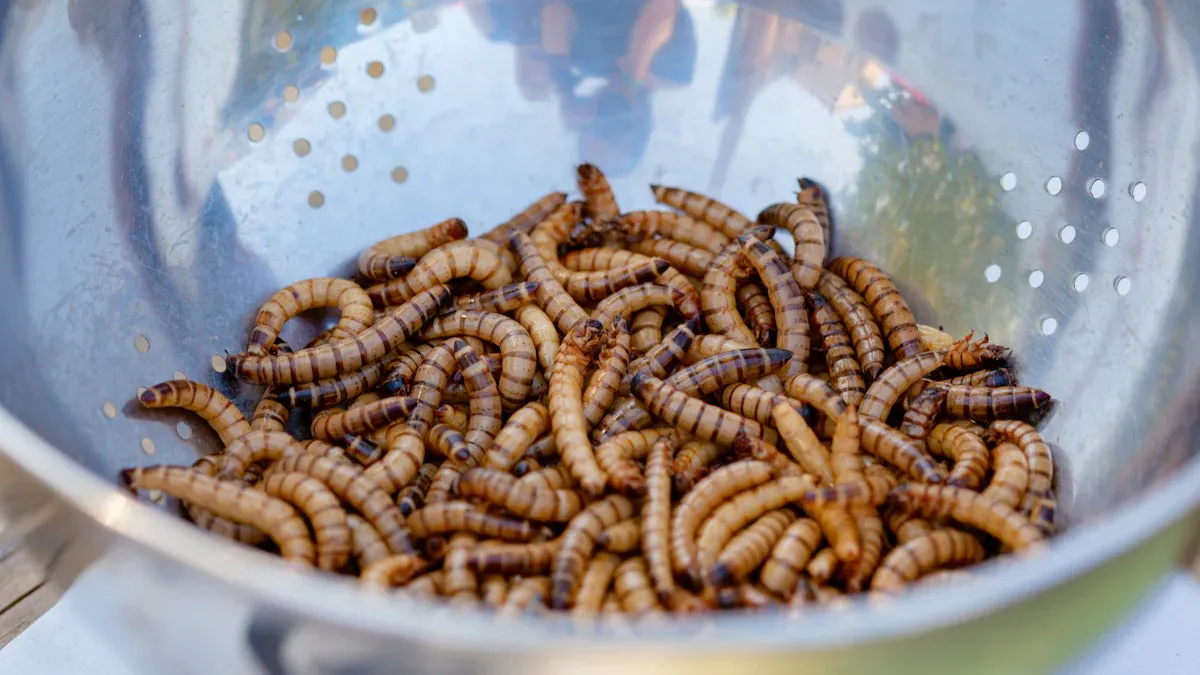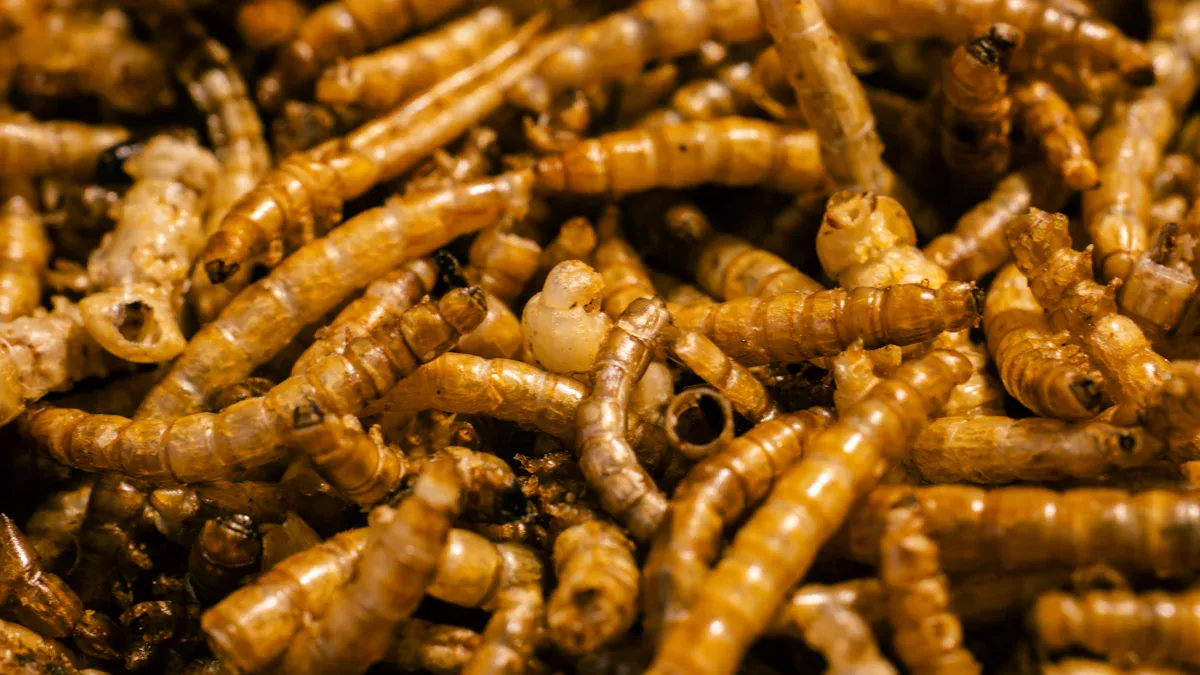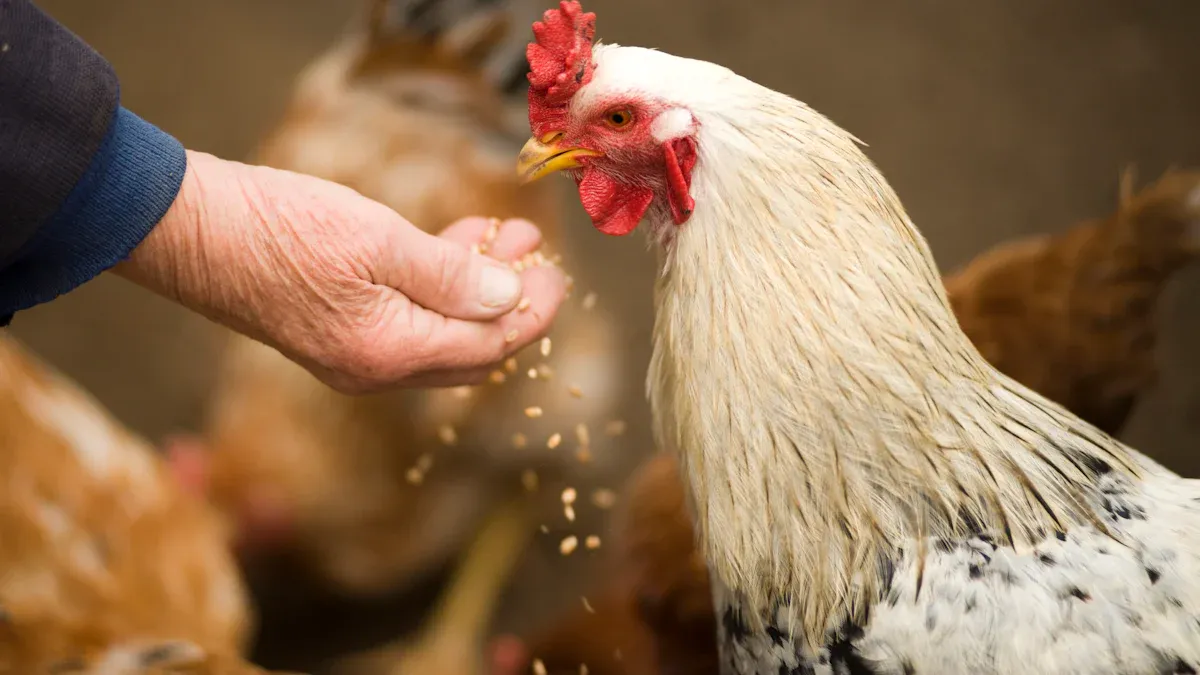
Have you ever wondered how to give your flock a health boost? Mealworms for Poultry Diets might be the answer you’re looking for. These tiny insects are packed with nutrients that your birds need. They’re rich in protein for feather growth and egg production, fats for energy, and even vitamins like B12 to keep your hens thriving. Plus, minerals like phosphorus strengthen bones, ensuring your birds stay active and healthy. Studies even show that mealworms can improve egg quality, with thicker shells and vibrant yolks. Adding them to your flock’s diet could make a noticeable difference.
Key Takeaways
- Mealworms are full of nutrients and great for poultry. They have a lot of protein (50-60%) that helps with egg laying and feather growth.
- Adding mealworms can improve eggs. The shells get thicker, and the yolks become richer, making the eggs better.
- Don’t overfeed mealworms. They should only be 10% of the flock’s diet. This keeps their nutrition balanced and the birds healthy.
Nutritional Benefits of Mealworms for Poultry Diets

Protein for Egg Production and Feather Growth
Protein is one of the most important nutrients your flock needs, and mealworms are an excellent source. With a protein content of 50-60%, mealworms outshine common feed options like corn (8-10%) and wheat (12-15%).
| Source | Protein Content (%) |
|---|---|
| Mealworms | 50-60 |
| Corn | ~8-10 |
| Wheat | ~12-15 |
Why does this matter? Protein plays a key role in egg production and feather growth. When your hens get enough protein, they can lay eggs more consistently and with better quality. You’ll notice thicker shells and vibrant yolks. Protein also helps your birds grow strong, healthy feathers, which is especially important during molting. Adding mealworms to their diet ensures they get the boost they need to stay productive and look their best.
Healthy Fats for Energy and Egg Quality
Mealworms don’t just provide protein—they’re also packed with healthy fats. These fats give your birds the energy they need to stay active and thrive. For laying hens, this extra energy supports consistent egg production. Plus, the fats in mealworms contribute to the quality of the eggs themselves, enhancing the yolk’s richness and color.
If you’ve ever noticed dull yolks or sluggish birds, it might be time to add mealworms to their diet. The balanced nutrition they offer can make a noticeable difference in your flock’s energy levels and the eggs they produce.
Essential Vitamins and Minerals for Stronger Birds
Mealworms for Poultry Diets are more than just a protein and fat source. They’re also rich in essential vitamins and minerals. For example, they contain vitamin B12, which supports nerve function, and phosphorus, which strengthens bones. These nutrients are vital for keeping your birds healthy and active.
Mealworms also provide calcium and vitamin D, which are crucial for egg production. Calcium helps form strong eggshells, while vitamin D ensures your birds can absorb it properly. By feeding your flock mealworms, you’re giving them a well-rounded diet that supports their overall health and productivity.
How Mealworms Enhance Egg Production and Bird Health

Richer Yolk Color and Stronger Eggshells
Have you noticed pale yolks or fragile eggshells in your flock? Mealworms can help fix that. Their high protein content and essential nutrients work wonders for egg quality. When you add mealworms to your flock’s diet, you’ll likely see brighter, richer yolks and sturdier eggshells.
- Feeding chickens protein-rich supplements, like mealworms, enhances yolk color and eggshell strength.
- The nutrients in mealworms, such as calcium and phosphorus, contribute to stronger shells.
By including mealworms in your poultry’s diet, you’re not just improving egg quality—you’re also giving your birds the nutrition they need to thrive.
Boosted Immunity and Disease Resistance
Keeping your flock healthy is a top priority, and mealworms can play a big role in that. These tiny insects are packed with nutrients that strengthen your birds’ immune systems. Healthier chickens are better equipped to fight off diseases and infections.
- Mealworms improve overall health and digestion, which supports immunity.
- They provide a natural, organic way to raise poultry with fewer health issues.
Adding mealworms to your flock’s diet can lead to fewer sick days and more productive birds.
Reduced Stress and Improved Behavior
Did you know mealworms can even improve your flock’s behavior? Studies show that feeding mealworms to poultry reduces fearfulness, especially in young birds. This means calmer, happier chickens.
When your birds feel less stressed, they’re more likely to lay consistently and interact positively with each other. Mealworms for Poultry Diets aren’t just a treat—they’re a way to create a more harmonious flock.
Practical Tips for Using Mealworms in Poultry Diets
Introducing Mealworms to Your Flock
If you’re introducing mealworms to your flock for the first time, start slow. Chickens love mealworms, but it’s important to use them as a supplement, not the main feed. Begin by scattering a small amount on the ground or placing them in a feeder. This encourages natural foraging behavior and helps your birds get used to the new treat.
Make sure the mealworms are fresh and healthy. Discard any that are dead or moldy. For dried mealworms, sprinkle them on your flock’s regular feed or serve them in a separate dish. Live mealworms can be especially engaging, as they stimulate your chickens’ instincts to peck and hunt. Always provide access to grit to help your birds digest the mealworm exoskeletons properly.
Ideal Quantities and Feeding Schedules
When it comes to feeding mealworms, moderation is key. Mealworms should make up about 10% of your flock’s total diet to avoid nutritional imbalances. For full-grown hens, a teaspoon to one and a half teaspoons of mealworms per day is ideal. Some poultry keepers prefer to feed them every other day instead.
If you’re using dried mealworms, you can offer up to one and a half tablespoons daily. However, live mealworms are richer in protein, so stick to smaller amounts. Adjust the quantity based on your flock’s size and activity level. Remember, mealworms are a treat, not a replacement for a balanced commercial feed.
Choosing the Right Type: Live vs. Dried Mealworms
Both live and dried mealworms have their advantages. Dried mealworms are convenient and have a long shelf life. They’re perfect for colder months when your flock needs extra energy, as they’re more calorically dense. On the other hand, live mealworms provide moisture, which is great for hydration during hot weather.
Live mealworms also encourage natural foraging behavior, keeping your chickens active and mentally stimulated. However, they require specific care to stay alive, which can be time-consuming. Dried mealworms are easier to store but may not engage your flock as much. Choose the type that best fits your needs and your flock’s preferences.
Risks and Precautions When Feeding Mealworms
Avoiding Overfeeding and Nutritional Imbalances
Mealworms are a fantastic treat, but feeding too many can cause problems for your flock. They’re not a complete food source, so relying on them too much can lead to health issues. Chickens might even start ignoring their regular feed, which contains essential nutrients they need to stay healthy.
Overfeeding mealworms can also cause weight gain and obesity because of their high fat content. This can make your birds less active and more prone to health problems. To avoid these issues, stick to moderation. Aim for mealworms to make up no more than 10% of your flock’s diet. Pair them with a balanced feed to ensure your chickens get all the nutrients they need.
Tip: Always scatter mealworms in small amounts and monitor your flock’s overall diet to prevent imbalances.
Ensuring Safe and Reliable Mealworm Sources
Not all mealworms are created equal. Some may carry harmful microorganisms like Spiroplasma or Erwinia, which can pose serious health risks to your flock. To keep your birds safe, always source mealworms from reputable suppliers who follow strict safety guidelines.
| Criteria for Sourcing Mealworms | Details |
|---|---|
| Microbial Quality | Mealworms from unreliable sources may contain harmful pathogens. |
Look for suppliers who test their products for contaminants and maintain high hygiene standards. This ensures you’re giving your flock a safe and nutritious treat.
Monitoring Birds for Allergies or Digestive Issues
Every flock is unique, and some birds might react differently to mealworms. Watch for signs of allergies or digestive problems, like diarrhea or changes in behavior, after introducing mealworms. If you notice anything unusual, reduce the amount or stop feeding them altogether.
Keeping an eye on your flock’s health ensures mealworms remain a beneficial addition to their diet. Always prioritize their well-being by observing how they respond to new foods.
Mealworms are a game-changer for poultry health and egg quality. They provide essential nutrients, boost egg production, and promote natural foraging behavior. By feeding them responsibly—using fresh, healthy mealworms and maintaining a balanced diet—you’ll see long-term benefits. Start today, and watch your flock thrive with healthier birds and better eggs! 🐔🥚
FAQ
How often should I feed mealworms to my chickens?
You can feed mealworms 2-3 times a week. Stick to small amounts, about 10% of their diet, to avoid overfeeding and ensure balanced nutrition.
Can baby chicks eat mealworms?
Yes, but only in moderation. Offer finely chopped mealworms to chicks older than two weeks. Always provide grit to help them digest the mealworms properly.
Are mealworms better than other protein sources?
Mealworms are excellent because of their high protein content and added nutrients. They’re a great supplement, but they shouldn’t replace a balanced commercial feed for your flock.


